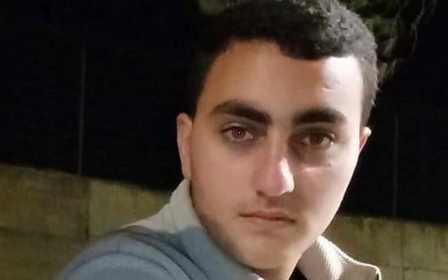UAE looks to lure Israeli doctors alienated by Netanyahu's judicial overhaul

Shilo, 32, is one of many doctors in Israel looking to head abroad, as the political polarisation deepened by the government's judicial overhaul programme leaves medical professionals wondering about their future.
"I've heard about many people looking for alternatives right now because of the political situation, myself included," said Shilo, who works at Wolfson Medical Centre in Holon, south of Tel Aviv, and who used a different name because he is not authorised to speak to the press.
"I spent six years of my life and paid with my own money to become a doctor for people who don't appreciate how bad this legislation is, not only for the doctors - but for our patients as well," he told Middle East Eye.
One country looking to take advantage of the situation is the United Arab Emirates, which is offering Israeli doctors lucrative contracts to make the switch.
According to reports in Israeli media, thousands of doctors have joined group chats on social media looking for advice on moving abroad, while others have already received high-paying offers from the UAE and Bahrain, which normalised relations with Israel in 2020.
New MEE newsletter: Jerusalem Dispatch
Sign up to get the latest insights and analysis on Israel-Palestine, alongside Turkey Unpacked and other MEE newsletters
The terms being offered include long-term visas and salaries three times higher than in Israel, as well as education opportunities and comfortable relocation packages for the families of physicians.
This comes as an unprecedented wave of protests continues in opposition to Israeli Prime Minister Benjamin Netanyahu's judicial overhaul programme.
Last month, Israeli lawmakers passed a key bill that would see the abolition of the "reasonableness standard", eliminating the Supreme Court's ability to block government decisions it deems unreasonable.
Israel's current government, which includes far-right figures like National Security Minister Itamar Ben-Gvir and Finance Minister Bezalel Smotrich, has been fiercely criticised by members of the Israeli establishment, including former Mossad chief Tamir Pardo, who branded it worse than the Ku Klux Klan.
Israeli healthcare at risk of collapse
This political polarisation is partly why some young Israeli doctors are rethinking their future in the country. Europe is one obvious destination, particularly for those who have studied there.
"In the past, doctors who came back from Europe with a medical degree weren't very welcome, or at least didn't get the residency that they wanted," said Shilo.
"Now, however, the medical students and doctors who studied abroad have the advantage of having a European degree, which is more acceptable in many EU countries."
According to the International Organization for Economic Co-operation and Development (OECD), more than 60 percent of doctors in Israel obtained their first medical degree outside the country. That's by far the highest share of any OECD country.
'Abolishing this [reasonableness standard] clause would allow political control over medical professionalism – politicising medicine'
- Hagai Levine, public health physician
Portugal has been mentioned as a preferred European destination, while there are also groups of doctors looking to travel to the United States, New Zealand and Canada.
A recent editorial in the Jerusalem Post warned that the Israel healthcare system is at "risk of collapsing, and judicial reform may be hurrying the process along".
The Israeli Medical Association (IMA), which represents about 95 percent of physicians in the country, also joined the protests, holding a two-hour strike in mid-July over the proposed judicial reforms.
Hagai Levine, chairman of the Israeli Association of Public Health Physicians, recently warned that the judicial overhaul could also severely impact the medical profession.
"Abolishing this [reasonableness standard] clause would allow political control over medical professionalism – politicising medicine – and would harm public health and medical autonomy. This is not reasonable," said Levine.
Win-win
Shilo told MEE that the current government does not appreciate the sacrifices he and his colleagues make - and that the judicial overhaul is going to make life worse for them and their patients.
There is already a shortage of doctors in Israel and at least 3,000 doctors have joined a WhatsApp group for doctors seeking advice on relocation overseas.
"I don't think doctors would have wanted to leave their home country just for the sake of it," said Shilo.
"It is a long journey to be able to practice medicine in a different country. So, if it's not due to the political situation, I don't see why they'd want to go through that," the young doctor said.
The proposed judicial changes have sparked 30 consecutive weeks of protests inside and outside of Israel, with former Israeli officials and Israel's staunchest ally, the US, warning against the "divisive" overhaul.
'I wouldn't be happy to work less and get paid more and be able to give the best care I can. It's a win-win situation for Israeli doctors and the UAE government'
Shilo, Israeli doctor
For Shilo, this is a tipping point, a development too difficult to ignore.
"The healthcare system in Israel is in very bad shape at the moment," he said.
"The salaries are ridiculous, the waiting times for a specialist can be as long as three to six months and the doctors work in 26-hour shifts. But even all that didn't make people think about leaving the country," the doctor told MEE.
In a sign of how serious the situation is being treated by the government, the health ministry's director-general, Moshe Bar Siman-Tov, urged doctors not to give up on Israel.
Reflecting on the lucrative offers being made to Israeli doctors in the Gulf, Shilo is candid.
"Saying that I wouldn't be happy to work less and get paid more and be able to give the best care I can, would be a lie," he told MEE.
"It's a win-win situation for Israeli doctors and the UAE government, but not for the people in Israel who seek quality and fast medical care... there's a lot of frustration right now and people won't leave Israel so easily," Shilo said.
"It's hard to get out of the comfort zone and leave because it's really hard to leave your home, family, friends and get to a place where the culture and language is different. But I also think some of us have had enough, so we might see people leave."
Middle East Eye delivers independent and unrivalled coverage and analysis of the Middle East, North Africa and beyond. To learn more about republishing this content and the associated fees, please fill out this form. More about MEE can be found here.




